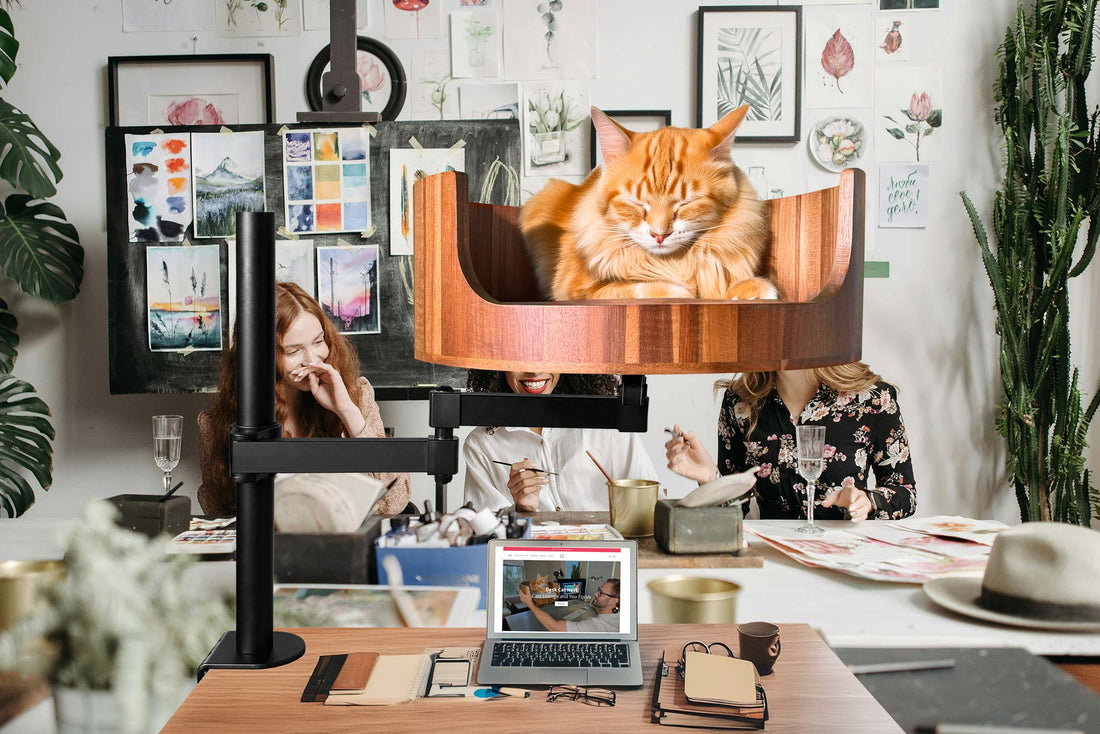
Why Does My Cat Twitch? Understanding Feline Behavior
Share
If you've ever noticed your cat twitching or jerking in their sleep, you may have been left wondering why. Feline behavior can be a mysterious and fascinating subject, and understanding why your cat twitches can provide valuable insights into their overall well-being. In this article, we will explore the reasons behind why cats twitch, what it might indicate about their health and happiness, and how you can best support your feline friend.
One possible reason for your cat's twitching could be related to their sleep cycles. Like humans, cats go through different stages of sleep, including rapid eye movement (REM) sleep where dreaming occurs. During this stage, it's not uncommon for cats to twitch, move their paws, or make small vocalizations as they dream. Additionally, twitching can also be a sign of pent-up energy or stress, especially if your cat is not getting enough physical or mental stimulation throughout the day. By understanding these behaviors and addressing any underlying issues, you can help ensure that your cat is happy, healthy, and well-rested.
1. Cats twitch for a variety of reasons, including dreaming, hunting instincts, and health issues.
2. Twitching during sleep is normal and typically indicates REM sleep, when cats may dream.
3. Twitching while awake could be a sign of anticipation, excitement, or predatory behavior.
4. In some cases, excessive twitching or seizures may indicate underlying health problems that require veterinary attention.
5. Understanding your cat's behavior and knowing when to seek professional help can help ensure your feline friend stays happy and healthy.
Causes of Cat Twitching
Cat twitching can be caused by a variety of factors. One common reason is dreaming. Just like humans, cats can experience rapid eye movement (REM) sleep, during which they may twitch or even vocalize. Other factors that can cause twitching include nerve disorders, stress or anxiety, and muscle fatigue. It's important to observe your cat's behavior and consult with a veterinarian if the twitching seems abnormal or excessive.
Physical Health Issues
Twitching can sometimes indicate underlying physical health issues in cats. Conditions such as epilepsy, hyperesthesia syndrome, or neurological disorders can cause twitching episodes. Additionally, parasites like fleas or ticks can irritate a cat's skin and lead to involuntary muscle movements. Regular vet check-ups and proper parasite prevention can help identify and address potential health issues before they escalate.
Behavioral Reasons
In some cases, cat twitching may be a behavioral response to certain stimuli. Cats may twitch when they are excited, scared, or trying to intimidate another animal. Twitching can also be a form of self-grooming behavior, especially if a cat is trying to remove debris or parasites from its fur. Understanding your cat's body language and triggers can help you decipher the behavioral reasons behind their twitching.
Environmental Factors
Environmental factors can also play a role in cat twitching. Changes in a cat's environment, such as moving to a new home, rearranging furniture, or introducing a new pet, can cause stress and anxiety, leading to twitching episodes. Creating a comfortable and safe space for your cat, with plenty of enrichment and stimulation, can help reduce stress and minimize twitching behaviors.
Desk Cat Nest FAQ
Why does my cat twitch?
There could be several reasons why your cat is twitching. It could be due to excitement, anxiety, muscle spasms, or even as a response to external stimuli. However, if the twitching persists or is accompanied by other concerning symptoms, it is best to consult with a veterinarian.
Will the Desk Cat Nest help reduce my cat's twitching?
The Desk Cat Nest provides a comfortable and cozy space for your cat to relax and destress, which may help reduce twitching caused by anxiety or excitement. However, it is not a substitute for medical treatment if the twitching is due to an underlying health issue.
Can I wash the Desk Cat Nest?
Yes, the Desk Cat Nest comes with a removable and machine-washable cushion for easy cleaning. We recommend washing it regularly to maintain a clean and hygienic environment for your cat.
Is the Desk Cat Nest suitable for all cat breeds?
Yes, the Desk Cat Nest is designed to accommodate cats of all sizes and breeds. The spacious interior provides plenty of room for your cat to stretch out and relax comfortably.
In conclusion, providing your cat with a designated space to relax and unwind, such as a Desk Cat Bed, can help reduce stress and anxiety, ultimately leading to fewer instances of twitching. This cozy and comfortable bed offers a safe and secure environment for your feline friend to rest, promoting better overall health and well-being. Investing in a Desk Cat Bed is a valuable choice for pet owners looking to improve their cat's quality of life and provide them with a dedicated space to unwind and destress. With benefits ranging from a sense of security to improved sleep quality, a Desk Cat Bed is a wise and practical investment for any cat owner concerned about why their cat may be twitching.



















































